In this edition of the roundup of important court judgments, we look at cases where constitutional courts made important observations about the role of judicial scrutiny, individual rights vs. national interest, horizontal reservations, and animal rights.
Supreme Court upholds Centre’s plan for Central Vista Project by 2:1 majority
On 05 January 2020, in the case Rajeev Suri vs. Delhi Development Authority & Ors., the Supreme Court was called upon to undertake a comprehensive and heightened judicial scrutiny regarding the permissibility of the Central Vista Project for the construction of a new parliament building. Issues concerning the change in land use, the grant of statutory and other permissions, environmental as well as heritage clearances were raised.
The submissions from the government side stated the urgent need for a larger working space for the efficient functioning of the highest legislative wing of the country. They also stated that the present parliament building not only falls short of sufficient space but also fire, water, electrical, and earthquake safety norms and poses a grave security risk for the legislators and secretariat staff.
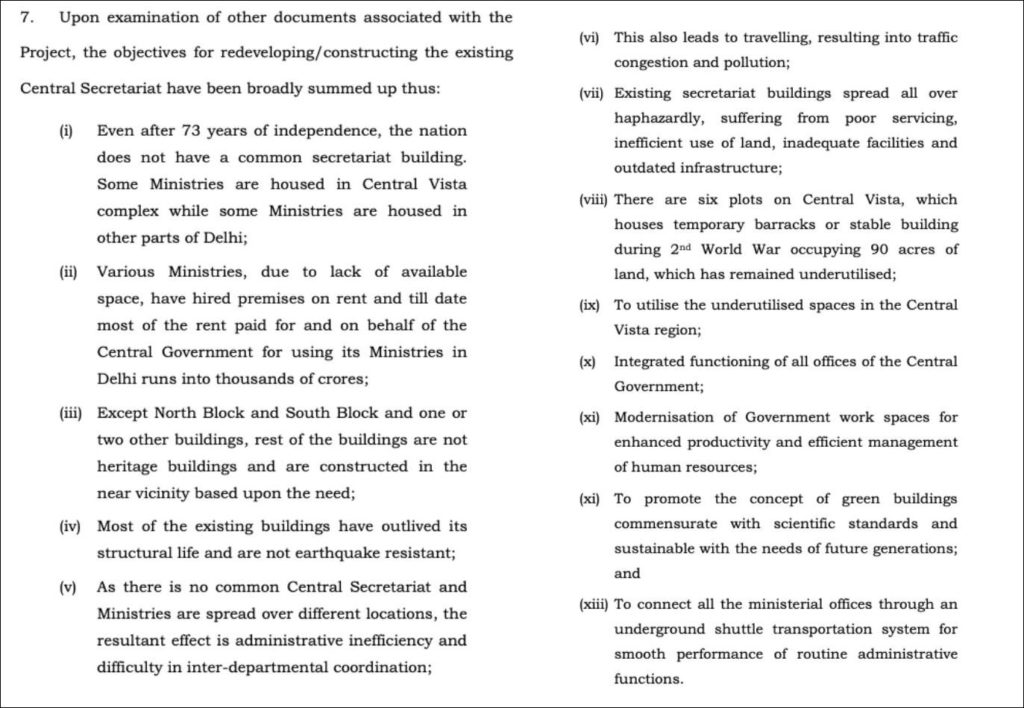
The submissions from the petitioner’s side challenge the legality of change in the land use of six plots in the Central Vista under the Delhi Development Act (DDA), 1957, and the permissions/approvals granted by the Central Vista Committee, the Delhi Urban Arts Commission under the Delhi Urban Arts Commission Act, 1973 and the clearance/no-objection for construction of a new Parliament House under the Environment Protection Act, 1986. It alleged the failure to take prior permission/approval of the Heritage Conservation Committee as per Annexure-II of the Unified Building Bye-Laws. The larger question relates to the government’s duty to consult and the scope and ambit of the citizen’s right to participate in the quasi-legislative exercise.
A Bench of Justices AM Khanwilkar, Dinesh Maheshwari, and Sanjiv Khanna pronounced the judgement. While Justices Khanwilkar and Maheshwari formed the majority, Judge Sanjiv Khanna penned a dissenting judgement on the aspects of public participation on the interpretation of the statutory provisions, failure to take prior approval of the Heritage Conservation Committee, and the order passed by the Expert Appraisal Committee. However, he agreed with the other judges on the aspects of notice inviting bid, the award of consultancy, and the order of the Urban Arts Commission.
The dissenting judgement took note of the Centre’s failure to ascribe to the principle of intelligible and adequate disclosure to fulfil the requirement of public participation.
The majority judgement declared that there is no infirmity in the grant of approvals by the Central Vista Committee (CVC), Delhi Urban Art Commission (DUAC), and Heritage Conservation Committee (HCC). The judgement observes that the exercise of power by the Central Government under the DDA Act, 1957 is just and proper and thus the modifications regarding the change in land use of plot stands confirmed. It also opined that the role of the Court is limited to examining the constitutionality including the legality of the policy and Government actions and it cannot be called upon to govern.
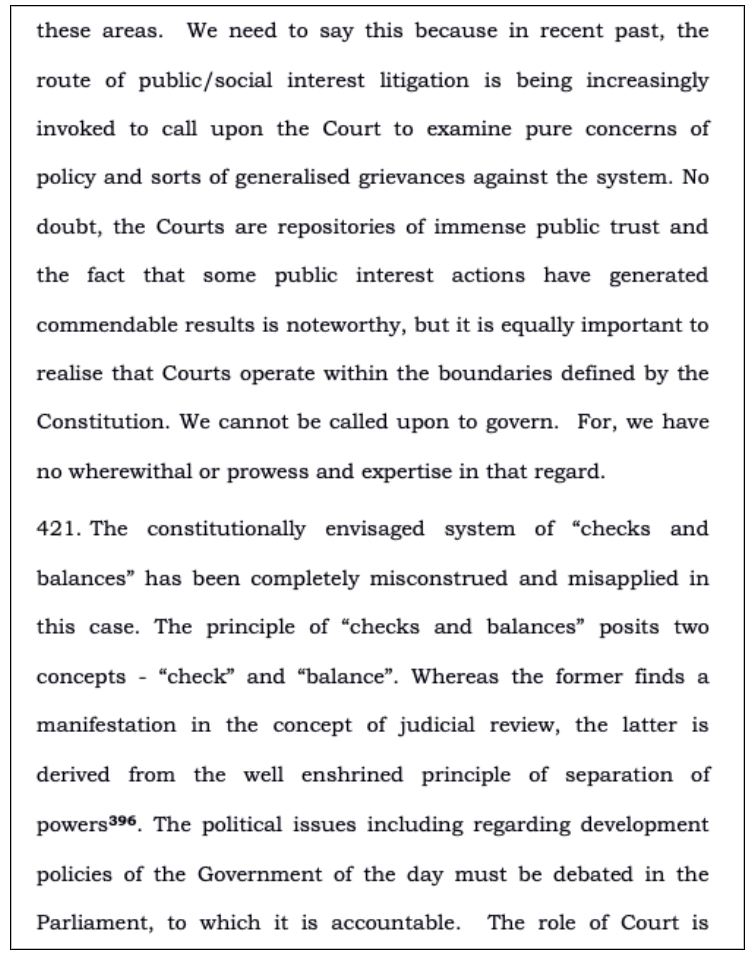
Kerala HC: Individual rights should subserve the national interest
In the case of Thwaha Fasal vs. Union of India, the Kerala High Court was considering the appeal filed by Union of India against the order passed by NIA (National Investigation Agency) Court granting bail to Thwaha Fasal, who was booked under UAPA (Unlawful Activities Prevention Act) for alleged Maoist links in September last year.
The NIA court granted them bail observing that the National Investigation Agency failed to establish a prima facie case under the Unlawful Activities Prevention Act (UAPA), 1967, against the accused as they have not indulged in any specific terrorist act or act of violence. In that view, the NIA court allowed the applications and released them on bail imposing certain conditions.
The High Court judgement, however, noted the opinion regarding the grant or otherwise of the bail must be reached by the courts not only in reference to the accusation in the FIR but also in reference to the contents of the case diary including the charge sheet and the other material gathered by the investigating agency.
The Division Bench of the High Court comprising Justices A. Hariprasad and K. Haripal observed that the documents seized from the accused carry the seeds of a secessionist ideology. The bench referred to the provisions of the UAPA Act and observed that if there are materials to infer that the accused have done something to promote or enthuse the activities of a terrorist organisation or done anything supporting its activities with the intention to further its activities, these offences are attracted. As per the agency, the accused was in possession of volatile materials from the banned CPI(Maoist) that could create unrest in the society.
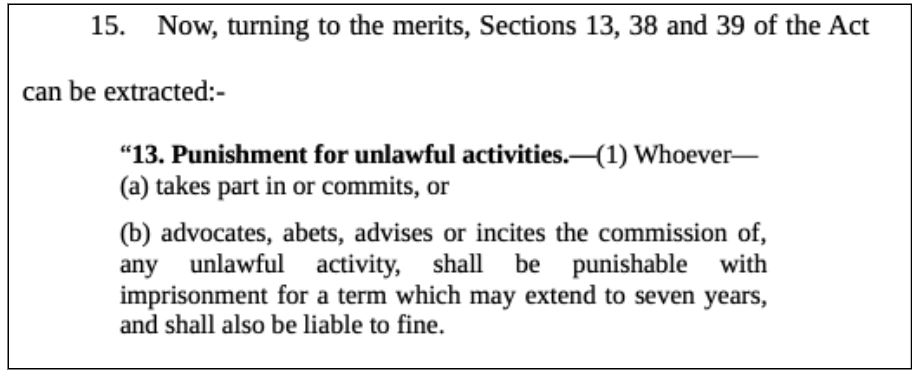
Hence, the bench cancelled the bail granted to Thwaha Fasal by the NIA court and opined that “when individual rights are pitted against national interest and security, the latter should prevail.” The bench, however, did not cancel the bail granted to another accused Allan Shuaib observing that there are numerous mitigating circumstances in his favour.
Supreme Court: Candidates belonging to reserved category are eligible to fill general/open category vacancies
In the case of Saurav Yadav & Ors. Vs. State of Uttar Pradesh, the apex court made important observations on the issue of vertical and horizontal reservations. The case was with respect to the selection process undertaken by the State of Uttar Pradesh to fill up 41,610 posts of Police Constables. Two applicants, Ms. Sonam Tomar and Ms. Reeta Rani approached the Court aggrieved with non-consideration of their claim (of OBC female and SC female candidates) against the posts meant for General Category female candidates and that candidates with lower marks have been selected in General Female category.
The judgement refers to various earlier judgments of the Supreme Court and High Court which deal with the issue of vertical and horizontal reservation. In the case of vertical reservations, the principle is well settled – candidates belonging to any of the vertical reservation categories are entitled to be selected in “Open or General Category”.
The judgement noted that the High Courts of Rajasthan, Bombay, Uttarakhand, and Gujarat have adopted the same principle (of vertical reservation) while dealing with horizontal reservation whereas the High Court of Allahabad and Madhya Pradesh have taken a contrary view. According to the second view, at the stage of accommodating candidates for effecting horizontal reservation, the candidates from reserved categories can be adjusted only against their own categories under the concerned vertical reservation and not against the “Open or General Category”.
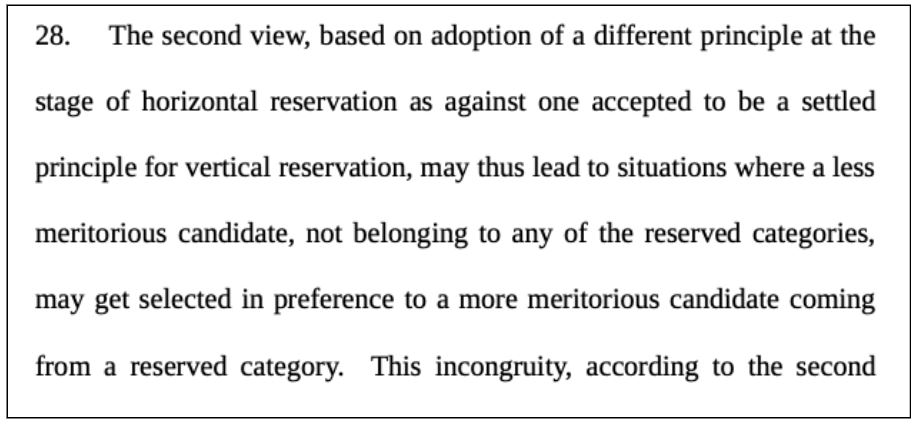
Disapproving the second view and rejecting the State’s contention that the women candidates who are entitled to benefit of social category reservations, cannot fill open category vacancies, the bench observed:
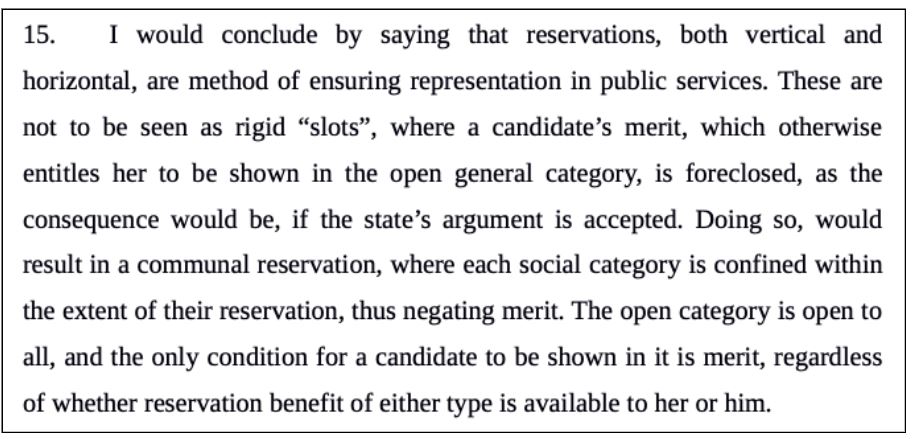
In conclusion, the apex court held that all candidates coming from ‘OBC Female Category’ who had secured more marks than the marks secured by the last candidate appointed in ‘General Category–Female’ must be offered employment as Constables in Uttar Pradesh Police.
Madras HC: Considering Elephant’s emotional bonding with caretaker, stops the department from taking its custody
In the case of Sheik Mohammed vs. The Principal Chief Conservator of Forests et al., the Madras High Court permitted a man to keep the custody of an elephant even though he does not have the requisite transfer certificate under the Wildlife Protection Act.
While dispensing this interesting judgement, Justice GR Swaminathan expressed that “just solutions to legal issues may sometimes lie outside the formal statutory framework.”
The case was regarding the possession of a female elephant named “Lalitha”, who was originally purchased by one G.Thangappan of Thirupuvanam. In 1988, the department issued a certificate of ownership in his favour. She then changed hands. Mohammed Aslam bought her in 1996 and sold her to Kannathu Kunju Mohammed. The writ petitioner i.e. Sheik Muhammed purchased her in 2000. He then applied in 2002 seeking transfer of ownership. The said request was kept pending and finally rejected in the year 2020. In this writ petition, Sheik Muhammed was challenging the move of the state wildlife department to take custody of “Lalitha”.
The court noted that the department’s view was legally valid and the writ petitioner was not in possession of the required documents to confirm his legal ownership of the Lalitha. However, the Court said that the peculiar case demanded the approach taken in child custody matters.
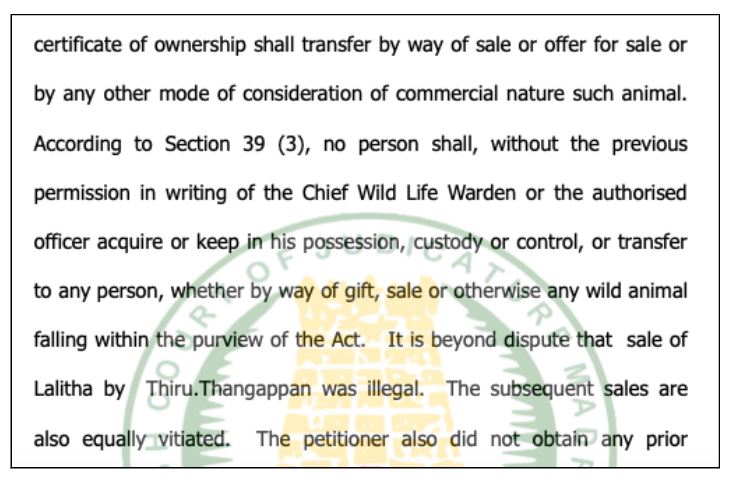
At the same time, the court also observed that Lalitha has been with the petitioner for more than 20 years and has developed a great bond with her caretakers. Therefore, a forcible relocation in alien surroundings is sure to traumatize her as feelings of love, grief, and compassion are equally found in the animals. The judgement noted that elephants are known to be sensitive and possessed of self-awareness. The judge also made a surprise inspection to examine the place of stay of ‘Lalitha’ and concluded that she was in good health and appropriately taken care of.
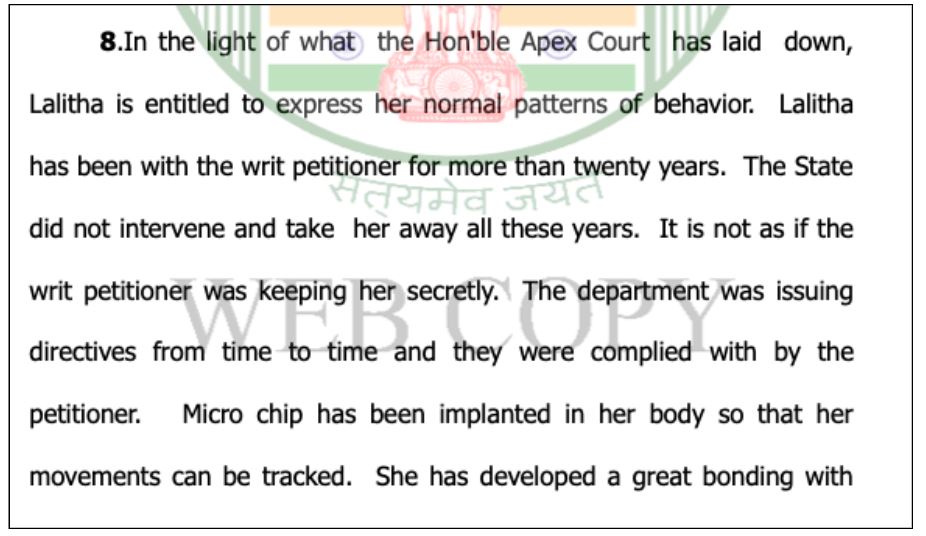
Applying the yardstick of what is good for Lalitha, the judge concluded that it was not in her best interest to allow the department to take her custody observing that “the rights of the animal are more relevant and they determine the adjudicatory outcome and not the formal validity of the administrative order”.
Featured Image: Central Vista Project and other Judgments


